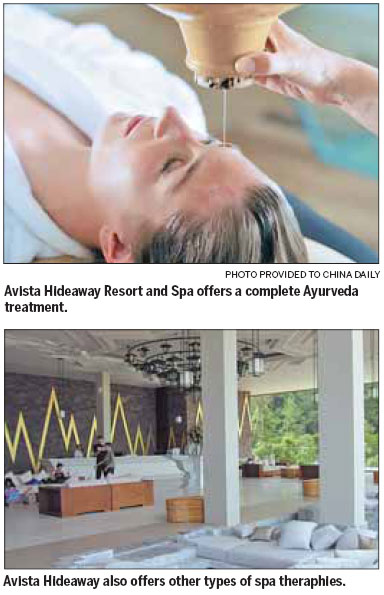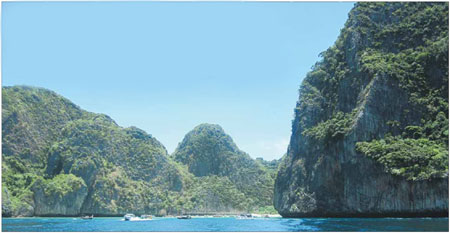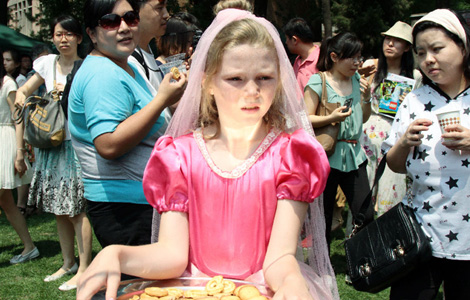Spa magic
Updated: 2013-06-02 08:04
By Valerie Ng (China Daily)
|
|||||||||||
|
When you are in Phuket, you can take a boat trip to Phi Phi Islands, where you can snorkel, enjoy the balmy waters or relax on the power sands, and not to forget feast on some of the freshest seafood. Photos by Valerie Ng / China Daily |
A veteran of pampering savors the complexity of an Ayurvedic treatment in Thailand. Valerie Ng shares the delight from Phuket.
Not long ago, a colleague wrote about how he was transformed from a spa virgin. I am a spa friend, if you'll excuse the word. Although easily tickled, I have braced myself for all kinds of spa treatments because of the supposed health benefits. There are all types of spa treatments in the market, from Swedish to Balinese, Indonesian, Thai and Chinese - from full body to shoulders only, foot reflexology, aromatherapy, scrub and more. And of course, there is also aqua treatment, namely whirlpool bath, which is suitable for those who are uncomfortable with massages.
In recent years, the Ayurvedic treatment has become a buzzword among health- and wellness-conscious people. For the uninitiated, it is a massage treatment involving a lot of oil, which is just a fraction of the story.
Ayurvedic practitioners believe that it is a holistic system of medicine. Defined as the science of life, it originated from India and has been around for over 3,000 years.
"Life according to Ayurveda is a combination of senses, mind, body and soul," says Alvin James, the in-house doctor of Avista Hideaway Resort and Spa on Phuket Island, Thailand. The resort has made Ayurveda its niche, although it also offers other types of spa therapies.
Before your treatment begins, an in-house Ayurvedic doctor will analyze your body, take your pulse rate and ask you questions about your lifestyle.
In Ayurveda, every human body has a defect against the cosmic rhythm, called dosha. But dosha is not harmful per se. It is prone to undergo aberrations during disturbances.
There are three body types in Ayurveda - vata (air), pitha (fire) and kapha (phlegm). Some people are more prone to one body type, while others may have combination body type.
Those with "air" body type move fast like the air. They are dynamic and fast learners but also forget easily. People with this body type tend to suffer from ailments related to dryness, for example, of the skin, of joints (which leads to aches in joints) and of the stomach (which leads to bloatedness if the wrong food is consumed).
"It brings a thought from the memory to consciousness, and transfers current experiences into memories. It inspires speech and is the base for laughter and exaltation. Air governs all such functions that involve somatic initiation, intellectual, perception, imagination, motivation and dynamism," says James, who will be training other therapists.
They are light sleepers and physically, "air" people are generally slim.
He says the best treatment to balance "air" is to administer the opposite. Yoga, which slows down and relaxes the body, is suitable.
"Fire" causes allergies and inflammation. It represents the somatic energy and maintains the natural pigmentation of cells. It generates and maintains some natural urges, like hunger, and is responsible for the complexion and suppleness of skin, as well as body temperature.
"Fire" body types are medium-built, and tend to be impatient. Some suffer from baldness or graying of hair.
Physically, "phlegm" types have a larger body frame, slower speech and are slower learners. Their skin is oilier, and they tend to have thick glossy hair.
"This type of body ages more slowly. 'Phlegm' gives mental strength and resistance to diseases," James explains.
He says a physician can only determine approximately 60 percent of a person's body type by analyzing the person physically, checking the person's pulse rate and finding out about the patient's lifestyle. As the doctor gets to know the person better, diagnosis will be easier.
By knowing the body type, an Ayurvedic doctor will be able to prescribe the right treatment. Ayurvedic treatment is a combination of medicine, diet and detoxification/cleansing. A combination of oil and herbal massage, and steam bath, is require as preparation for the cleansing treatment, which is divided into above neck, stomach and back, hip to feet, and full body.
"Everyone is different and requires different treatment. Each of our treatments is personalized," says James, adding that it is important to keep in touch with your therapists after a resort stay so that the treatment is sustainable.
Since April, the resort has offered a complete Ayurveda treatment, known as the Shirodhra, which involves 2.5 liters of oil being poured slowly over your forehead.
Contact the writer at valerie@chinadaily.com.cn.


(China Daily 06/02/2013 page16)
Today's Top News
Xi pledges more aid to Caribbean countries
A meeting of immense scope
Ambassador envisions long, fruitful relationship
Hanban ties up with University of West Indies
Leaders highlight economic ties
Tokyo seeks to catch up in Africa
Dialogue is the way forward in Asia
2 dead, 21 injured in Taiwan quake
Hot Topics
Lunar probe , China growth forecasts, Emission rules get tougher, China seen through 'colored lens', International board,
Editor's Picks

|

|

|

|

|

|






